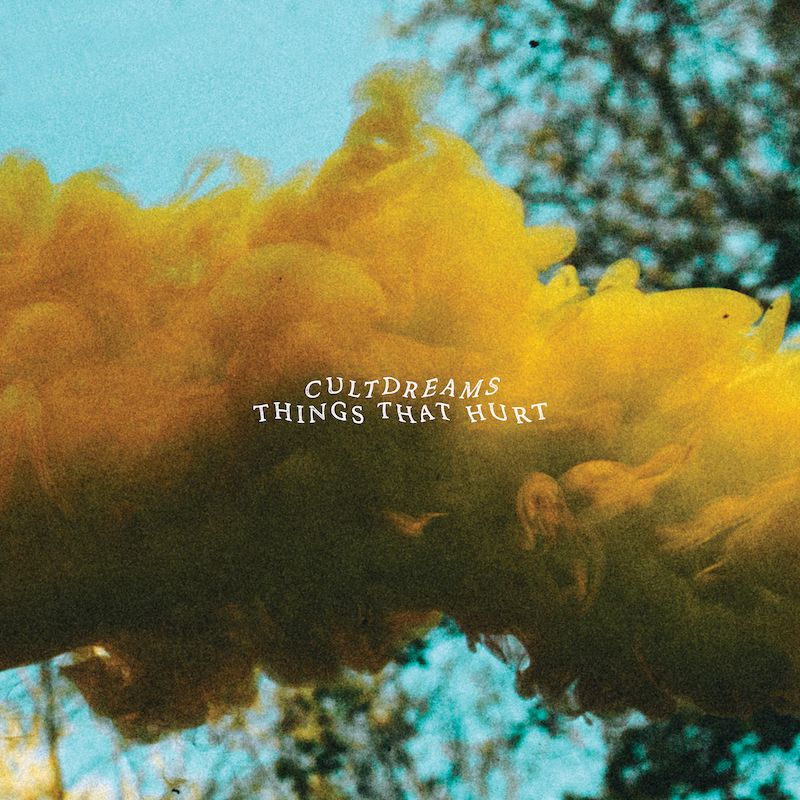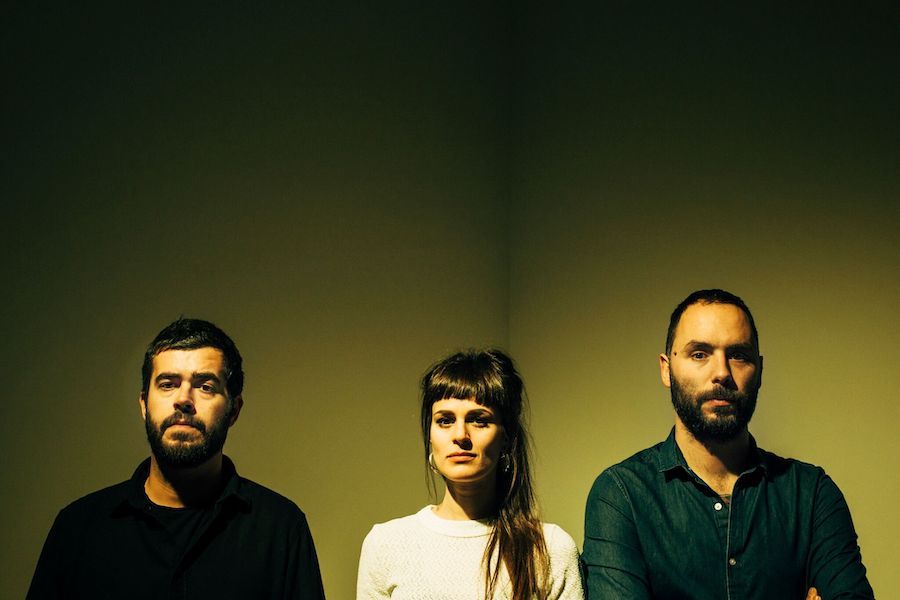
With little hope and determination they had left, the quartet turned to Kickstarter to look for financial help for a new record. With a goal of $30,000, the band reached that target in just 24 hours. In the end they exceeded their target with a momentous $86,278 being raised from fans. As a result of this, the band were rejuvenated and encouraged by the support they had received.
The resulting record is ‘Phoenix,’ a collection of focused alternative pop rock songs with soaring choruses and bright, favourable melodies. From hearing ‘Phoenix,’ it’s clear this is a new start for The Classic Crime and as a bonus, ‘Phoenix’ recently entered the Billboard 200 Album Chart at number 130.
Already Heard caught up with Matt MacDonald to discuss ‘Phoenix,’ the Kickstarter service, life as an newly unsigned band and more.
Already Heard: Could you introduce yourself and your role in The Classic Crime?
Matt: I’m Matt, I sing and play guitar and do lots of other things for the band.
AH: You’ve a new album called ‘Phoenix.’ What is the record about?
Matt: Conceptually it’s about the time spent in the ashes of your aspirations. Going independent and losing a founding member were pretty hard knocks for us to take. We were a bit at a loss for what to do, so we did the only thing we knew. We wrote songs. The songs represent that feeling of hopelessness a bit, but they also have inspired our rebirth in a way. Through the ashes there is hope… so that’s where the Phoenix concept materializes.
AH: This is your first record as an unsigned band. How has the process from being a signed band to an unsigned band affected you both as a band and personally?
Matt: We had no idea the work it would take to release a record on par with our previous label-backed releases. We all spent hundreds of hours gathering web assets, fulfilling Kickstarter packages, developing and implementing a marketing plan with media and prizes… It’s something that I’m glad we did ourselves, because it really bridged the gap between us and our fans and allowed us to connect on a more honest level. But I’m not sure I’ll look forward to doing it all again. It is a lot of work and stress on top of the normal band duties.
<a href=”http://theclassiccrime.bandcamp.com/album/phoenix” data-mce-href=”http://theclassiccrime.bandcamp.com/album/phoenix”>Phoenix by The Classic Crime</a>
AH: As a band what were your first reactions when you no longer had a label?
Matt: We were happy/sad. Excited, but fearful. We were blessed to have a label that built our platform and our fanbase to a place where we could technically “afford” to go independent, but we were fearful of the fact that perhaps not enough people cared, leaving us making a lesser-product or hanging it up for good. It was an insecure time for us… but at the same time we were excited at the endless opportunities the future held.
AH: You raise funds for the album, you used the Kickstarter service. Who’s idea was it to use Kickstarter and how affective was it for you?
Matt: We decided we didn’t want to make a sub-par product. We had a standard quality we had produced, and we needed money to produce another record on par with it. We looked into a lot of crowd-funding options to raise the money needed, but settled on Kickstarter because of it’s ubiquity, simplicity, and low commission rate.
AH: Having raised $85,000 from Kickstarter, did it give the band a new found confidence?
Matt: It gave us an incredible feeling of responsibility, but also it rejuvenated our band. All of the questions we had about whether or not people cared enough to support new music from us were answered. It was such an overwhelming outpouring of support… it basically erased all of our doubts and fears. It gave us hope that we could continue making music for a long time.
AH: Did having support from fans and Kickstarter affect the songwriting of ‘Phoenix’ in any way?
Matt: The songs were all written before we launched our Kickstarter campaign, but it did add some pressure. We’d raised almost 300% of what we asked for, which made us feel responsible to deliver 300% of what our backers expected. I wanted to make an album that was 300% better than what they wanted. That some pressure, but it was motivated by gratitude, so it was more of an inspirational effort. I definitely believe the songs sound better because of how well our backers backed us.
AH: What are your thoughts on some of the criticism Kickstarer has had in the past?
Matt: I suppose the criticism for the music industry is that it’s not a working model. The assumption is that people will get tired of being asked to back an artist time and again. I think I understand that critique. For us, I don’t think we would want to continue to require pledges for every record, even IF our backers are 100% satisfied with their rewards. Most of our backers are saying that they would back us again, and a fair amount of folks said they were either too late or too broke to back us the first time, so they’re waiting until we do another one. We haven’t decided whether or not we’ll do another Kickstarter, because we don’t want it to wear thin with our fans. We’ll have to address that when the time comes to make another record.
AH: What advice would you give bands who are considering using services like Kickstarter?
Matt: Make sure you have a fan base. For music and art, it isn’t a place to launch your career. People aren’t going to give you money unless you’ve established yourself as a producer of product that they like. If they like all of your previous stuff, they’re more likely to back you for some future stuff. If you have little or no previous stuff, Kickstarter is not for you. You’ll be discouraged by how it turns out. Make sure you develop a fan base and have a good relationship with them before you launch any sort of campaign for them to purchase rewards from you.
AH: Compared to previous release, how has the bands sound developed on ‘Phoenix’?
Matt: As far as layers of sound and texture, this record has the most depth. I think this is due to the fact that I had two months to comp and edit the tracks. During this time I’d be playing through the tracks, listening for parts that would jump out of the harmonics from the guitars… a pad here, a melody line there. The tracks have organ, keys, piano, strings, and plenty of other sounds we’ve never used on a record before. It was fun to experiment new tones and textures, and I think that’s what make this record stand out from our previous releases.
AH: Are there any key songs that best represent the bands new sound?
Matt: Personally, I love ‘The Precipice’ and ‘Dead Rose.’ They both represent two different directions. ‘The Precipice’ has no electric guitar in it, which is rare for our a band with three electric guitar players. The main players are kick drum, acoustic guitar, strings and piano, which is quite a departure from any song on previous records. ‘Dead Rose’ is a wide mix, without the wall of sound rhythm crunch that we’re known for. It’s carried by a fast, articulated beat that changes very little, which is different for us as we generally like to change feel and groove throughout a song. I love how it drives and how it feels. The vocals are carried in a way that we’ve rarely carried them before.
AH: You self-produced the record. What was the reason for this move?
Matt: I’ve produced a handful of records, but “Phoenix” is definitely the biggest. I’m fairly proficient in recording and editing in ProTools (audio recording software) and I know my way around a studio. It’s funny, but 10 years in this business qualifies me for not much outside of recording and performing music. I think my previous production projects helped me gain confidence in the quality I could produce, and when I hesitated at the suggestion to produce The Classic Crime, my manager and my band said “Go for it.” So I accepted the challenge.
AH: With the album going in the Billboard 200 at number 130, I guess the reaction has been overwhelming?
Matt: We were pretty happy to discover that. Considering that 1,941 backers on Kickstarter purchased the record as a reward but were not counted on the charts, that number was still really good. Had they counted we would have charted much higher, but the beautiful thing about being DIY is that we don’t really rely on the charts. We rely our fans, and nobody plays the aggregator between us and them. We can communicate with them directly, and we can provide for them instantly, so as much as it is nice to get some affirmation from the establishment, we don’t live and die by the charts or the numbers. It’s always nice to see our name next to the big cats, though.
AH: What message do you hope fans take away from ‘Phoenix’?
Matt: I hope it assists in snapping people out of complacent living. I hope it relates to their struggle in a way that inspires action and risk-taking. I hope they can sing to it for years and find new meaning with each listen.
AH: Any final words to finish off this interview?
Matt: Just one big thank you to our backers, supporters, and fans. We couldn’t have done this without you!
‘Phoenix’ by The Classic Crime is available now on iTunes and Bandcamp.
The Classic Crime links: Facebook|Twitter|Youtube|Bandcamp|Instagram
Words by Sean Reid (@SeanReid86)





